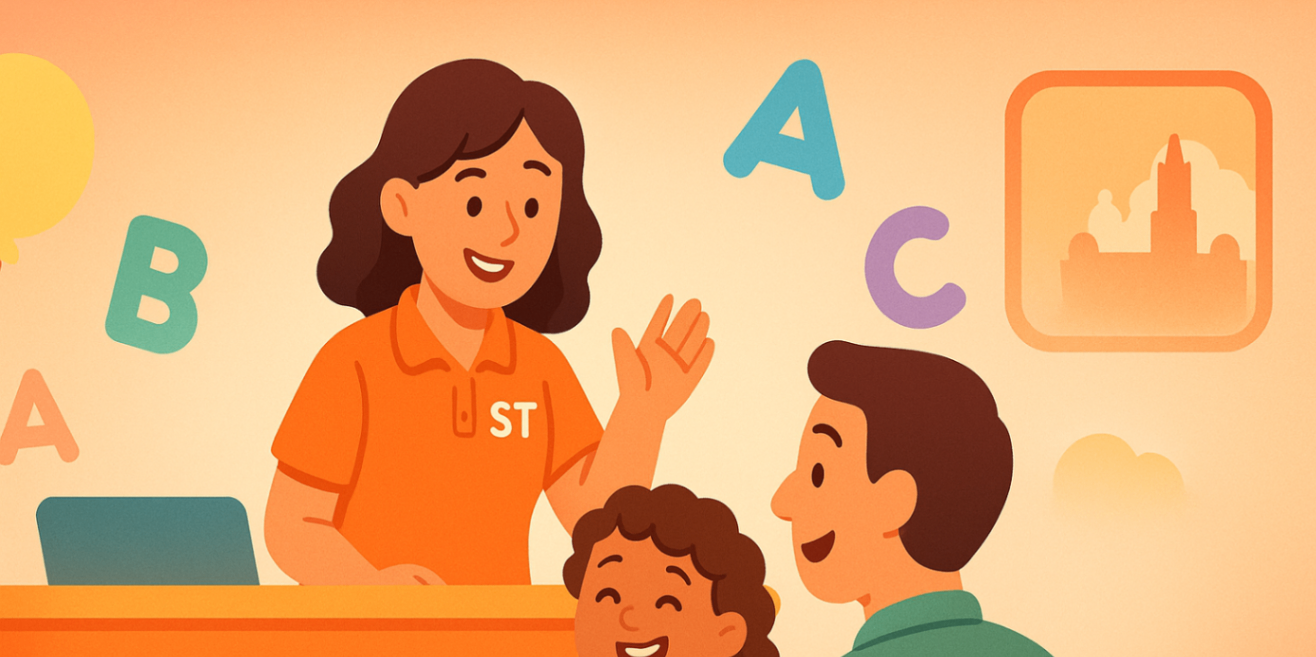
expert insights: paediatric speech pathologist liverpool
26 August, 2025
Introduction
When your child’s communication journey needs specialist guidance, the expertise of a paediatric speech pathologist can make all the difference. At daar in Liverpool, our speech pathologists bring evidence-based methods, a child-centred approach and NDIS-approved services to help children improve speech, language and social interaction in home, school and community settings.
If you want to know the early signs and when to seek help, read Children’s Speech Therapy Liverpool — Recognising the Need.
Key Highlights
-
Paediatric speech therapy in Liverpool uses a collaborative approach, working with parents, carers, and schools.
-
Specialised support is available for a range of communication difficulties, including language comprehension, speech sounds, and social skills.
-
The process begins with a referral from a designated professional, such as a health visitor, teacher, or paediatrician. Initial assessments help create personalised therapy plans focused on your child's specific needs and goals.
-
When choosing a Liverpool paediatric speech pathologist, look for professionals who hold recognised qualifications in speech and language therapy, are registered with relevant bodies such as the Health and Care Professions Council (HCPC), and have experience working with children. These credentials help ensure they are equipped to assess your child and develop effective therapy plans after receiving a referral.
-
Initial assessments help create personalised therapy plans focused on your child's specific needs and goals.
-
The primary aim of language therapy is to empower you with skills to support your child’s communication development.
-
Evidence-based techniques ensure your child receives the best support for improving their communication skills and confidence.
Understanding Paediatric Speech Pathology in Liverpool

Paediatric speech pathology is more than helping children articulate sounds. It covers how children understand language, form sentences, interact socially, and sometimes use alternative communication tools. In a place like Liverpool, where children come from diverse backgrounds and face a range of communication needs, a local specialist can tailor therapy to your child’s everyday world — linking home life, school routines and community activities.
For a clear, local view of therapy options (clinic, home, telehealth) and how personalised programs build confidence, read NDIS Speech Therapy Liverpool — Personalised Support for Kids.
What a Speech Pathologist Does and Why It Matters
From a professional perspective, a speech pathologist assesses communication skills, identifies barriers, and devises a tailored plan for your child. Some of the key roles they fulfil:
-
Diagnosing speech sound disorders, language delays, social communication difficulties and conditions like autism.
-
Working with families and schools so therapy continues beyond sessions.
-
Integrating your child’s interests, home environment and cultural background for better engagement.
By placing your child at the centre of therapy, you’re not just addressing immediate needs — you’re building communication resilience that lasts.
Who we help: common communication needs & referrals
We help children who have different communication difficulties. The child may have trouble understanding what others say. Some children find it hard to make sentences, say words clearly, or talk with other people. We also help children who have issues with their voice, can ’t speak in some places (selective mutism), or have problems with eating and drinking.
To get our help, you need a referral from a designated referrer. This person will talk with you about your worries and help you fill out the referral form. This is the first step to get your child support.
The assessment process: what to expect at the first appointment
The assessment process is the first stage in our time working together. Your first meeting will usually be at a clinic in the community. This gives you and the speech and language therapist a chance to talk about your main worries and come up with a plan together. You might have many questions about your child, and this meeting helps you share those. It is a good time to say what you are thinking and find out if seeing a specialist is needed.
The therapist will want to know a lot about your child’s life. They may ask:
-
What made you decide to come in, and what worries you the most.
-
What you have tried to help your child so far.
-
Who can give support to your child.
-
The ways your child’s struggles affect them at home or school.
The therapist might watch your child while they play or listen to how they talk and say what they need. After this clear first look, you will talk about possible therapy plans and how long support may take. The goal is for you and the therapist to work as a team, so your child can get the best support.
Therapy approaches & techniques we use with children
 In Liverpool, we use a variety of evidence-based therapy approaches and techniques tailored to each child's individual needs. A typical paediatric speech therapy session is interactive and often play-based, designed to be engaging and effective. The goal is to improve skills like speech clarity, fluency, and overall communication development in a supportive environment. Our therapists work to find the right methods that will help your child make meaningful progress.
In Liverpool, we use a variety of evidence-based therapy approaches and techniques tailored to each child's individual needs. A typical paediatric speech therapy session is interactive and often play-based, designed to be engaging and effective. The goal is to improve skills like speech clarity, fluency, and overall communication development in a supportive environment. Our therapists work to find the right methods that will help your child make meaningful progress.
We implement advanced treatments to address a wide range of speech and language challenges. Collaboration with families is central to these approaches, ensuring that strategies are reinforced at home and school. Below are some of the therapy approaches we may use.
This article explains common assessment steps and what parents can expect from an initial speech pathology review — see Factors for Choosing the Right Speech Therapist — Liverpool to help you compare clinicians and approaches.
|
Therapy Approach |
Description |
|---|---|
|
PROMPT |
Uses tactile cues on the face to guide oral muscles for clearer speech production. |
|
Lidcombe Program |
A behavioural treatment for young children who stutter, involving parent-led positive reinforcement. |
|
Phonological Awareness |
Teaches children to recognise and manipulate sounds in language to build a foundation for reading and spelling. |
|
Responsive Feeding Practices |
Creates a positive mealtime environment by attuning to a child's hunger cues to address feeding difficulties. |
How NDIS-Funded Speech Therapy Works Locally
For children with communication difficulties that affect their daily life or learning, the NDIS may provide funding for speech therapy. At daar Liverpool, we guide families through how NDIS funding works: from understanding plan categories to selecting a registered provider and tracking progress. Whether your child attends a clinic, has therapy at home or uses telehealth, our team ensures services align with your child’s goals, daily context and the NDIS funding you have available.
How to get started (appointments, referrals & what happens next)
Getting started with paediatric exercise physiology is easier than you think. At daar Liverpool, our friendly team will guide you every step of the way. Whether you’re looking to boost your child’s motor skills, build confidence, or access NDIS-funded supports, we’ll make the process simple.
You don’t need to wait for a referral—just reach out to us directly. Our team will answer your questions, explain funding options (NDIS or private health), and help you book your first session at a time that suits you.
Choosing the Right Specialist in Liverpool
Not all speech pathologists are the same — for children with complex language or speech needs, you’ll want an expert with the right experience, approach and local presence. Here are key criteria Liverpool families should look for:
-
Registration with Speech Pathology Australia and NDIS provider status.
-
Proven experience working with children, especially those with developmental or communication challenges.
-
Flexible service delivery (clinic, home, school, telehealth) to match your child’s environment.
-
A collaborative approach: therapist, family and educators working together to reinforce communication skills in real life.
At daar, our local team meets these standards — helping families in Liverpool, Casula, Moorebank, Prestons and surrounds feel confident about their child’s path to better communication.
Call us today at 02 9133 2500 or book your child’s appointment online to take the first step toward building strength, confidence, and lifelong healthy habits with daar.
Frequently Asked Questions
How do I refer my child to a speech pathologist in Liverpool?
To begin the referral process, you need to talk to a designated referrer. This can be your health visitor, your child’s teacher, or a doctor. They will go over your concerns with you. Then, you and the referrer will fill out the referral form together. After that, they will send the referral form to the liverpool community team for the SLT service in liverpool.
Are both private and NHS speech therapy options available for children?
Yes, families in Liverpool can get both NHS speech therapy and private speech services. Having these options means you can choose what is best to help your child's communication development in a range of settings. This gives you the chance to find the service or approach that will work well for your child, whether you pick private speech or NHS speech pathology.
Do Liverpool speech pathologists provide home or school visits?
Initial language therapy meetings usually happen in the clinic. The Liverpool community team can also set up times to meet in other places. Follow-up speech therapy can be at your home or in educational settings. This is done if the team thinks that it will give the best support to the child and their carers. The choice depends on what will work well for their therapy plans and daily needs.
.svg)

















